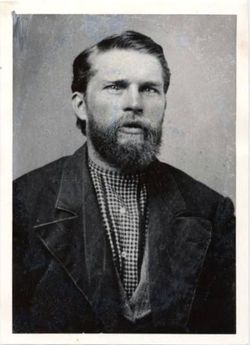In 1835 he signed up with the Wyeth's Columbia River Fishing and Trading Company and was a sailor aboard the Nathaniel Wyeth supply ship which sailed from Boston around Cape Horn to Fort Vancouver. The ship floated into a gale and limped into a port in Chile, it took three months to fix the brig.
About 1836 he joined the American Fur Trading Company and between 1838 and 1839 he had a number of successful journeys through the Yellowstone area which yielded a good number of pelts. In 1839 he became separated from his group. The party waited a couple of days for Trask to find them, but the fear of Blackfeet attack forced the trappers to leave for Fort Hall. Trask rode into Fort Hall unharmed in Sept. of 1839.
In 1843, the ship headed to the Hawaiian Islands carrying lumber and returning with slaves and much needed supplies for Wyeth. In Oregon at Fort William, Trask spent the summer working on the ship, packing salmon, etc.
Trask joined a wagon train headed for Oregon probably serving as a guide. In the coastal area of Oregon near Astoria and Tillamook, Trask worked at various mills and at these ports he was the official greeter to the pioneers arriving by ship.
He built a home east of Tillamook and was a partner in the building of a boat which shipped settlers produce to California and helped bring cattle to the Willamette Valley.
Trask built a fort, "Fort Trask", around his home due to Indian troubles that erupted in the area. Fort Trask was used by many locals as a refuge and Trask was able to avert some trouble due to his fur trapper background. The Tillamook Indians knew Trask's word was a bond and so they helped fight roving bands of trouble makers which helped save the lives of many settlers.
Elbridge Trask is buried in the Pioneer Cemetery east of Tillamook, OR. Since the exact location of his grave is not known, a memorial plaque has been placed at the entrance. His home was across the road from the present day Sunset Memorial Cemetery.
In 1835 he signed up with the Wyeth's Columbia River Fishing and Trading Company and was a sailor aboard the Nathaniel Wyeth supply ship which sailed from Boston around Cape Horn to Fort Vancouver. The ship floated into a gale and limped into a port in Chile, it took three months to fix the brig.
About 1836 he joined the American Fur Trading Company and between 1838 and 1839 he had a number of successful journeys through the Yellowstone area which yielded a good number of pelts. In 1839 he became separated from his group. The party waited a couple of days for Trask to find them, but the fear of Blackfeet attack forced the trappers to leave for Fort Hall. Trask rode into Fort Hall unharmed in Sept. of 1839.
In 1843, the ship headed to the Hawaiian Islands carrying lumber and returning with slaves and much needed supplies for Wyeth. In Oregon at Fort William, Trask spent the summer working on the ship, packing salmon, etc.
Trask joined a wagon train headed for Oregon probably serving as a guide. In the coastal area of Oregon near Astoria and Tillamook, Trask worked at various mills and at these ports he was the official greeter to the pioneers arriving by ship.
He built a home east of Tillamook and was a partner in the building of a boat which shipped settlers produce to California and helped bring cattle to the Willamette Valley.
Trask built a fort, "Fort Trask", around his home due to Indian troubles that erupted in the area. Fort Trask was used by many locals as a refuge and Trask was able to avert some trouble due to his fur trapper background. The Tillamook Indians knew Trask's word was a bond and so they helped fight roving bands of trouble makers which helped save the lives of many settlers.
Elbridge Trask is buried in the Pioneer Cemetery east of Tillamook, OR. Since the exact location of his grave is not known, a memorial plaque has been placed at the entrance. His home was across the road from the present day Sunset Memorial Cemetery.













